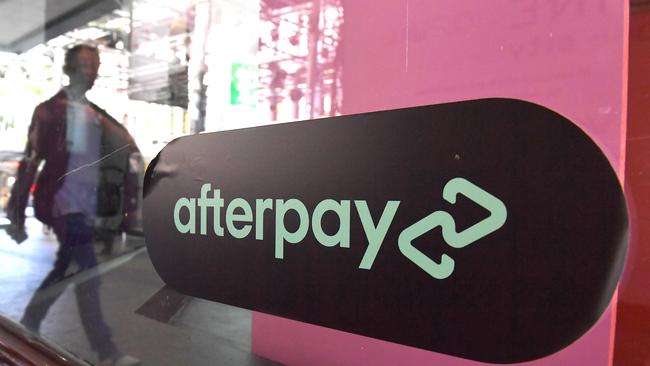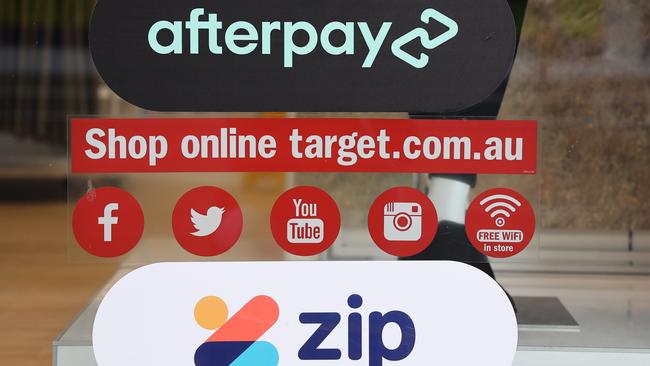Buy now, pay later sector faces licence requirement as Treasury warns of inappropriate lending
Treasury considers slapping new obligations on the booming buy now, pay later sector amid concerns of ‘inappropriate lending’.

Australia’s buy now, pay later providers would need to obtain a credit licence and meet responsible lending obligations under two of three options put by Treasury to the government for assessment.
In a discussion paper to be released on Monday, Treasury officials say that BNPL’s “relatively looser regulatory environment” – together with the sector’s rapid growth – may be contributing to poor consumer outcomes.
Issues raised with the officials, the document notes, include inappropriate lending practices that are contributing to financial stress. Some 19 per cent of BNPL consumers surveyed by the corporate regulator, Treasury adds, said they had cut back or gone without essentials to make repayments.
Other issues identified by the Treasury paper include excessive consumer fees and charges, some of which “may be disproportionate compared to the value of credit provided”, the document states.
Treasury was tasked by the Albanese government in July with providing advice on how to regulate the sector, which had 7 million active accounts in the 12 months to June 30 and recorded $16bn in transactions, up 37 per cent.
The least demanding of three options put forward by the Treasury officials would amend the Credit Act to impose a requirement for BNPL providers to check that a product is not unaffordable for a person before it is offered to them. Under that option, income and expense information would only be assessed if the amount being lent was above a certain figure and if a person was identified as risky.
There would be no need to obtain an Australian Credit Licence, although some parts of a strengthened industry code would be overseen by the Australian Securities & Investments Commission.

The Australian Finance Industry Association last month commissioned a review of the BNPL code of conduct, six months earlier than originally planned.
The two other proposals would bring the sector into the Credit Act and apply either a tailored version of responsible lending obligations or the version that currently applies to all credit providers. These options would force providers to hold an Australian Credit Licence. “BNPL providers would be prohibited from increasing a consumer’s spending limit without explicit instructions from the consumer,” the document reads.
Other countries, including Britain and New Zealand, are also moving to impose tighter regulation on the BNPL sector.
In June, the British Treasury outlined plans to require affordability checks on customers and to ensure advertisements are “fair, clear, and not misleading”.
Providers offering the product will need to be approved by the Financial Conduct Authority, and borrowers will be able to lodge complaints with the Financial Ombudsman Service.
This month, the New Zealand government proposed rules which would require BNPL to conduct an affordability check on customers before agreeing to a loan. The new requirements would apply to loans above $NZ600 ($553).
On Sunday, Financial Services Minister Stephen Jones said similar threshold proposals in Australia were among the issues that would be considered in the subsequent discussion period, which the government hopes to conclude before the holiday break. “I’m starting from the proposition that BNPL is a credit product, and if it is a credit product it should be regulated as every other consumer credit product is,” Mr Jones told The Australian. “There may be a case that can be made that some different arrangements are needed because of the nature of this product, but I am not really interested in having arguments about whether it’s a credit product or not. “(It is) clearly providing great competition in the credit market. I think that is a good thing, challenging the incumbents in the credit card market.
“But I think it’s hard being able to do that because a lot of the regulations that apply to other credit products don’t apply to them, and there are questions to be asked about whether some of those provisions should.
“But I don’t want to stifle innovation. I don’t want to stifle new business coming into the market and shaking up the old ones. That is important. We just want to make sure it happens in a safe ecosystem,” Mr Jones said.

Consumer groups have been arguing that BNPL providers should be required to be licensed, warning about the potential harm to consumers from products that do not have credit checks.
“BNPL and … early-wage access providers are increasingly coming up in calls to the national debt helpline,” Consumer Action Law Centre chief executive Gerard Brody said last month. “We argued that it should be brought within the National Consumer Credit Protection Act of the credit code so each of these providers are required to be licensed.”
The regulations would come at a difficult time for the industry, amid rising funding costs and bad debts, along with more competition from the major banks.
Brokers at Macquarie told clients in a note last month that they retained a cautious outlook despite a 10.7 per cent rise in traffic for the 12 months to the end of September for BNPL apps.
“The macroeconomic environment continues to be volatile, with high inflation being addressed through rising interest rates to soften spending,” the note reads.
BNPL products are lightly regulated because they largely operate by using an exemption for interest-free offerings, charging fees in a way that means they are not under the Credit Act. That means responsible lending obligations – requiring an assessment of whether a product or credit limit is unsuitable for the user – do not apply to BNPL products.
Currently, nine providers – Afterpay, Brighte, Humm, Klarna, Latitude, Openpay, Payright, Plenti and Zip – are signatories to the industry code, which includes some provisions about suitability assessments, complaint handling and hardship provisions.






To join the conversation, please log in. Don't have an account? Register
Join the conversation, you are commenting as Logout